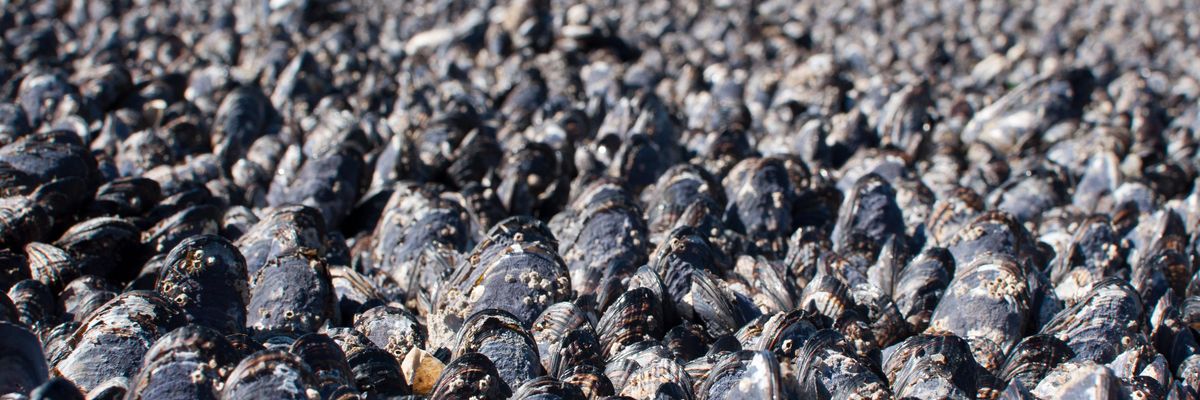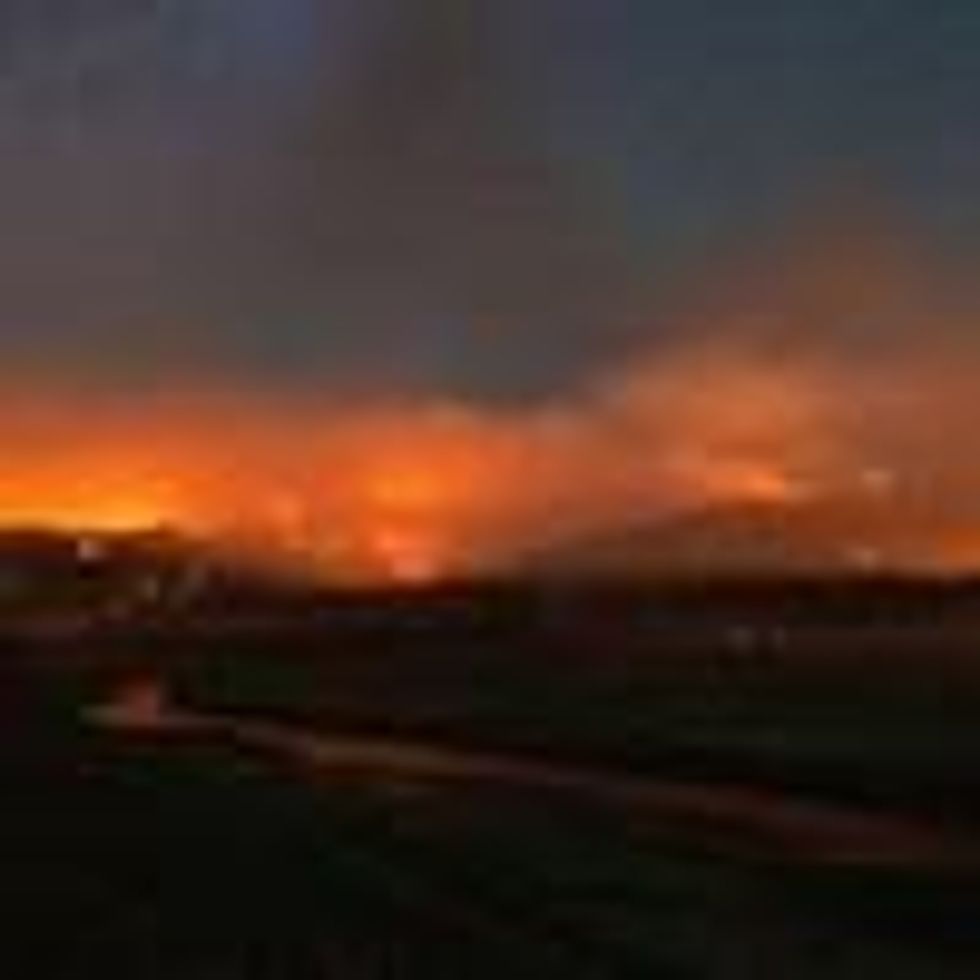

SUBSCRIBE TO OUR FREE NEWSLETTER
Daily news & progressive opinion—funded by the people, not the corporations—delivered straight to your inbox.
5
#000000
#FFFFFF
To donate by check, phone, or other method, see our More Ways to Give page.


Daily news & progressive opinion—funded by the people, not the corporations—delivered straight to your inbox.

A mussel bed on Vancouver Island. (Photo: Stephen Bentsen/CC BY-NC-ND 2.0)
It's "a frightening warning sign," said one observer.
"Heartbreaking," another commented.
"Can we now mobilize en masse to save all Earthly beings?" asked another.
Those were some of the responses to new reporting by the CBC on how last week's extreme heatwave that gripped British Columbia may have led to the deaths of over one billion intertidal animals like mussels and starfish that inhabit the Salish Sea coastline.
Christopher Harley, a marine ecologist at the University of British Columbia, told the outlet about how he had noticed a foul odor from dead intertidal animals on rocks at Vancouver's popular Kitsilano Beach as the city experienced record heat. Harley then set off with a team of researchers to gather data on nearby coastlines.
What the researchers noticed, CBC reported, were "endless rows of mussels with dead meat attached inside the shell, along with other dead creatures like sea stars and barnacles."
Related Content

They tracked temperatures too, recording 50degC (122degF) on rocky shoreline habitats, well above the high 30s (around 100degF) mussels can endure for short spurts. Harley likened a mussel on the rock enduring the scorching temperatures to "a toddler left in a car on a hot day"--stuck "at the mercy of the environment" until the tide returns. "And on Saturday, Sunday, Monday, during the heat wave, it just got so hot that the mussels, there was nothing they could do."
The heat wave was deadly for humans too.
Lisa Lapointe, British Columbia's chief coroner, announced Friday that from June 25 to July 1, the province's death toll was 719--three times higher than normal--and said heat was likely "a significant contributing factor to the increased number of deaths." The heat wave was also blamed for dozens of deaths in the U.S. states of Oregon and Washington.
The recent heat wave's deadly impact on shellfish was noted in the U.S. Pacific Northwest as well.
The Daily Mail reported last week on comments from the family-run Hama Hama Oyster company in Washington. "The epic heatwave is something no one has seen and then we had a low tide that was as far as it has been in 15 years and it happened mid-day," the company said.
The clams "look like they had just been cooked, like they were ready to eat," the company told the outlet.
In a June 30 Instagram post sharing an image of heat-impact clams, the company had a clear message: "Please vote for politicians who are brave enough to address climate change."
Dear Common Dreams reader, The U.S. is on a fast track to authoritarianism like nothing I've ever seen. Meanwhile, corporate news outlets are utterly capitulating to Trump, twisting their coverage to avoid drawing his ire while lining up to stuff cash in his pockets. That's why I believe that Common Dreams is doing the best and most consequential reporting that we've ever done. Our small but mighty team is a progressive reporting powerhouse, covering the news every day that the corporate media never will. Our mission has always been simple: To inform. To inspire. And to ignite change for the common good. Now here's the key piece that I want all our readers to understand: None of this would be possible without your financial support. That's not just some fundraising cliche. It's the absolute and literal truth. We don't accept corporate advertising and never will. We don't have a paywall because we don't think people should be blocked from critical news based on their ability to pay. Everything we do is funded by the donations of readers like you. Will you donate now to help power the nonprofit, independent reporting of Common Dreams? Thank you for being a vital member of our community. Together, we can keep independent journalism alive when it’s needed most. - Craig Brown, Co-founder |
It's "a frightening warning sign," said one observer.
"Heartbreaking," another commented.
"Can we now mobilize en masse to save all Earthly beings?" asked another.
Those were some of the responses to new reporting by the CBC on how last week's extreme heatwave that gripped British Columbia may have led to the deaths of over one billion intertidal animals like mussels and starfish that inhabit the Salish Sea coastline.
Christopher Harley, a marine ecologist at the University of British Columbia, told the outlet about how he had noticed a foul odor from dead intertidal animals on rocks at Vancouver's popular Kitsilano Beach as the city experienced record heat. Harley then set off with a team of researchers to gather data on nearby coastlines.
What the researchers noticed, CBC reported, were "endless rows of mussels with dead meat attached inside the shell, along with other dead creatures like sea stars and barnacles."
Related Content

They tracked temperatures too, recording 50degC (122degF) on rocky shoreline habitats, well above the high 30s (around 100degF) mussels can endure for short spurts. Harley likened a mussel on the rock enduring the scorching temperatures to "a toddler left in a car on a hot day"--stuck "at the mercy of the environment" until the tide returns. "And on Saturday, Sunday, Monday, during the heat wave, it just got so hot that the mussels, there was nothing they could do."
The heat wave was deadly for humans too.
Lisa Lapointe, British Columbia's chief coroner, announced Friday that from June 25 to July 1, the province's death toll was 719--three times higher than normal--and said heat was likely "a significant contributing factor to the increased number of deaths." The heat wave was also blamed for dozens of deaths in the U.S. states of Oregon and Washington.
The recent heat wave's deadly impact on shellfish was noted in the U.S. Pacific Northwest as well.
The Daily Mail reported last week on comments from the family-run Hama Hama Oyster company in Washington. "The epic heatwave is something no one has seen and then we had a low tide that was as far as it has been in 15 years and it happened mid-day," the company said.
The clams "look like they had just been cooked, like they were ready to eat," the company told the outlet.
In a June 30 Instagram post sharing an image of heat-impact clams, the company had a clear message: "Please vote for politicians who are brave enough to address climate change."
It's "a frightening warning sign," said one observer.
"Heartbreaking," another commented.
"Can we now mobilize en masse to save all Earthly beings?" asked another.
Those were some of the responses to new reporting by the CBC on how last week's extreme heatwave that gripped British Columbia may have led to the deaths of over one billion intertidal animals like mussels and starfish that inhabit the Salish Sea coastline.
Christopher Harley, a marine ecologist at the University of British Columbia, told the outlet about how he had noticed a foul odor from dead intertidal animals on rocks at Vancouver's popular Kitsilano Beach as the city experienced record heat. Harley then set off with a team of researchers to gather data on nearby coastlines.
What the researchers noticed, CBC reported, were "endless rows of mussels with dead meat attached inside the shell, along with other dead creatures like sea stars and barnacles."
Related Content

They tracked temperatures too, recording 50degC (122degF) on rocky shoreline habitats, well above the high 30s (around 100degF) mussels can endure for short spurts. Harley likened a mussel on the rock enduring the scorching temperatures to "a toddler left in a car on a hot day"--stuck "at the mercy of the environment" until the tide returns. "And on Saturday, Sunday, Monday, during the heat wave, it just got so hot that the mussels, there was nothing they could do."
The heat wave was deadly for humans too.
Lisa Lapointe, British Columbia's chief coroner, announced Friday that from June 25 to July 1, the province's death toll was 719--three times higher than normal--and said heat was likely "a significant contributing factor to the increased number of deaths." The heat wave was also blamed for dozens of deaths in the U.S. states of Oregon and Washington.
The recent heat wave's deadly impact on shellfish was noted in the U.S. Pacific Northwest as well.
The Daily Mail reported last week on comments from the family-run Hama Hama Oyster company in Washington. "The epic heatwave is something no one has seen and then we had a low tide that was as far as it has been in 15 years and it happened mid-day," the company said.
The clams "look like they had just been cooked, like they were ready to eat," the company told the outlet.
In a June 30 Instagram post sharing an image of heat-impact clams, the company had a clear message: "Please vote for politicians who are brave enough to address climate change."